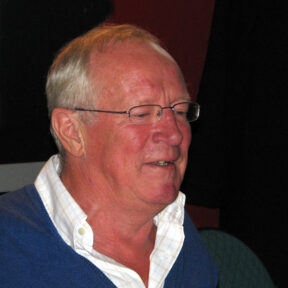
Robert Fisk
Photo from Wikimedia Commons / Author of Photo: Alan LieftingOverview
* Former Middle East correspondent for the British newspaper “The Independent”
* Wrote for “The Nation” magazine
* Accused Israel of “apartheid” and of “bestializing” the Palestinian people
* Died on October 30, 2020
Born in England in July 1946, Robert Fisk was the Middle East correspondent for the leftwing British paper, The Independent. His articles are disseminated on leftist websites such as Znet, CounterCurrents, CounterPunch, and CommonDreams. He also wrote for The Nation. A 2005 New York Times article described Fisk as “probably the most famous foreign correspondent in Britain.”
Fisk received a bachelor’s degree in English Literature from Lancaster University in 1968, and a Ph.D. in Political Science from Trinity College in Ireland 17 years later. He covered the Middle East for The Times of London from 1976 to 1987, and for other outlets thereafter from his home in Beirut, Lebanon. He also has covered military conflicts in Algeria, Afghanistan, and Yugoslavia.
Fisk’s mission as a journalist was “to challenge authority — all authority — especially so when governments and politicians take us to war.” Candidly acknowledging that neutral reportage is not his goal, Fisk approvingly quotes the Israeli journalist Amira Hass: “There is a misconception that journalists can be objective … What journalism is really about is to monitor power and the centres of power.”
Fisk conducted three interviews with Osama bin Laden, all published by The Independent. These took place on December 6, 1993; July 10, 1996; and March 22, 1997. During one of those interviews, bin Laden, who had taken a liking to Fisk, said: “Mr. Robert, one of our brothers had a dream. He dreamed … that you were a spiritual person … this means you are a true Muslim.” In a 2004 videotape, bin Laden praised Fisk as a “neutral” reporter who understood Islamist grievances.
Fisk also interviewed such notables as Saddam Hussein, Ayatollah Khomeini, and Sadeq Khalkhali (the hanging judge of the Iranian revolution).
Fisk consistently denounced Israel and the United States as oppressive exploiters that provoke the enmity of other nations around the world. While he condemned the September 11, 2001 terrorist attacks as a “hideous crime against humanity,” he immediately called for an “honest discussion” about the motives behind those attacks — a discussion which he said was lacking in the Western press. For his part, Fisk ascribed the attacks chiefly to legitimate Arab anger over U.S. policies in the Middle East, particularly America’s support for Israel.
In August 2007 Fisk expressed, for the first time, his personal doubts about what really had occurred on 9/11. He stopped short of actually blaming the U.S. government, reasoning that “the Bush administration has screwed up everything — militarily, politically, diplomatically — it has tried to do in the Middle East; so how on earth could it successfully bring off the international crimes against humanity in the United States on 11 September 2001?” He did write, however, that he was “increasingly troubled at the inconsistencies in the official narrative of 9/11.” He elaborated:
“It’s not just the obvious non sequiturs: where are the aircraft parts (engines, etc) from the attack on the Pentagon? Why have the officials involved in the United 93 flight (which crashed in Pennsylvania) been muzzled? Why did flight 93’s debris spread over miles when it was supposed to have crashed in one piece in a field?… I am talking about scientific issues. If it is true, for example, that kerosene burns at 820C under optimum conditions, how come the steel beams of the twin towers — whose melting point is supposed to be about 1,480C — would snap through at the same time?… What about the third tower … which collapsed … when no aircraft had hit it?”
Fisk has described Israel as a racist state, akin to Apartheid South Africa, guilty of “bestializing” the Palestinian people. He also has portrayed as cowards those reporters who “abe[t] terrible deeds in the Middle East” by “refus[ing] to tell the [ugly] truth about Israel” because they fear “being slandered as ‘anti-Semites.’”
In January 2009, when Israel was involved in a raging battle against Hamas in the Gaza Strip, Fisk recounted a litany of alleged “war crimes” the Jewish state had committed in a host of previous military conflicts against its Arab neighbors. Accusing Israel of having “opened the gates of hell to the Palestinians,” he dismissed “the old lie” which maintains “that Israelis take such great care to avoid civilian casualties.” He further derided the West for being oblivious to the many legitimate reasons why Arabs seek to attack Western interests.
Fisk contributed to the 2000 book Iraq Under Siege: The Deadly Impact of Sanctions and War, which blamed U.S. sanctions (instead of Saddam Hussein‘s greed or the corrupt United Nations Oil-for-Food Program) for malnutrition, disease, and increased infant mortality in 1990s Iraq. This book was edited by Anthony Arnove. Fellow contributors included Noam Chomsky, John Pilger, Howard Zinn, Rania Masri, Phyllis Bennis, Robert Jensen, Angela Davis, Kathy Kelly, and the group Voices in the Wilderness.
Fisk also contributed to a 2001 collection of essays titled The New Intifada: Resisting Israel’s Apartheid. Other notable contributors included Noam Chomsky, Alison Weir, and the late Edward Said.
Fisk has published several books of his own, including: The Point of No Return: The Strike which Broke the British in Ulster (1975); Pity the Nation: Lebanon at War (1990); In Time of War: Ireland, Ulster and the Price of Neutrality, 1939-1945 (2001); The Great War for Civilisation: The Conquest of the Middle East (2005); and The Age of the Warrior: Selected Writings (2008).
Fisk died October 30, 2020 in Dublin, Ireland.
For additional Information on Robert Fisk, click here.